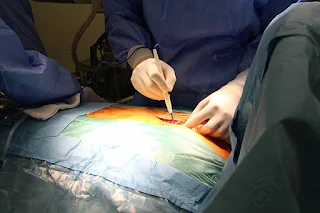Surgery for Mesothelioma Cancer
Mesothelioma is a rare,
aggressive cancer caused by asbestos exposure that forms on the protective
lining of the lungs, abdomen, or heart. There are a few tumors/forms(.) to
sweep away/bring down as a frontline treatment (mainly at the beginning of the
disease).
Types of Surgery for Mesothelioma Cancer
Extrapleural pneumonectomy: A
radical operation in which a lung, a portion of the diaphragm, the pleura
(lining of the lung), and, occasionally, the pericardium are removed. It is
suitable for otherwise healthy patients with early-stage pleural mesothelioma.
Its goal is to remove as much of the tumor as is visible, but it is very high
risk because it is so invasive.
Pleurectomy/decortication is a
less radical procedure designed to remove the pleura and visible tumor nodules,
as opposed to removing (resecting) the entire lung. This is an alternative,
typically offered to EPP-intolerant patients or in a scenario when the lung is
to be preserved. It displayed a beneficial effect as a single or combinatorial
therapy in prolonging the overall survival.
Cytoreductive surgery and HIPEC
are frequently used in the management of peritoneal mesothelioma. This is
cutting out the tumors inside the abdomen and then pouring heated
chemotherapy directly into the belly. This method of getting bugs down to the
tumor bypasses the rest of the body, affecting the rest of the cancer
spreading cancer, and is a well-tolerated & effective drug for the selected
patient.
Eligibility and Diagnosis Assessment of
eligibility and diagnosis
Surgery for mesothelioma cancer
is not appropriate for all patients. Evaluation for eligibility needs to be
done in a comprehensive diagnostic manner. This evaluation may include imaging
tests like CT scans, MRI scans, and PET scans and biopsies to help determine
the type and stage of mesothelioma. Lung and heart workups are also done to
see if the patient is capable of withstanding the physical stress of the
surgery.
For each patient, a
multidisciplinary team including a specialist oncologist, radiologist, and
general thoracic surgeon experienced in advanced-stage LC and palliative care
plans the treatment. Surgery may have a potential role in patients with local
disease and good medical status and no significant comorbidity. There could
potentially be treatments that are less invasive or for persons in poor health,
in advanced stages of disease, or in palliative condition.
Goals and Benefits of Surgery for Mesothelioma
Cancer
The principal aim of surgery for
mesothelioma cancer is a microscopic complete macroscopic resection (R0),
i.e., the resection of all macroscopic tumor tissue. That doesn’t mean curing
the cancer, but it may substantially reduce the tumor burden, relieve symptoms
like chest pain or the sensation of inability to breathe, and possibly
help prolong life.
Surgery not only promises
physical relief, but it can also provide patients with a psychological sense of
control and a way to plan their lives in the face of a devastating diagnosis.
Patients’ perceived quality of life after surgery is usually very good,
especially if substantial levels of pain are relieved. Furthermore, surgical
resection of tumors can also enhance the effectiveness of subsequent therapies
(including chemotherapy and immunotherapy that are most effective in treating
microscopic disease after surgical debulking of tumors).
Risks and Complications
Like all major medical
procedures, they can have risks. Potential shunting side effects include
hemorrhage, infection, respiratory problems, and reduction of breathing ability
in some cases. In addition, the invasiveness of interventions such as EPP may
predispose to long-term sequelae. Ke. = Healing can be prolonged, with several
weeks or months of recovery that consist of physical, respiratory, and
nutritional rehabilitation.
Patients must also
absolutely have realistic expectations. Success with surgery is not just the
added survival time; it's also about relief of symptoms and better day-to-day
function. However, continued good postoperative care, observation, and support
are essential in the path to recovery.
2.1. Multimodal Therapy Inclusion
Surgery for mesothelioma cancer
is very rarely used alone. It is often effectively used as part of a multimodal
program that combines a number of different treatments. For instance, patients
with EPP might receive systemic chemotherapy before and after surgery
(neoadjuvant and adjuvant treatment). The goal is to shrink tumors before
surgery and annihilate any remaining cancer cells afterward.
Radiotherapy may also be
administered, particularly when complete excision of the tumor is challenging.
In other situations, such as intraoperative radiation or IMRT or the like, it
may be desirable or necessary to deliver the RT to remaining tumor cells very
precisely.
New therapies, of which
immunotherapy and targeted therapy are now being incorporated, are now
being tested in the surgery suite. These therapies may not yet be the standard,
but they are showing clinical promise and may further challenge the treatment
model for mesothelioma.
Long-term and survival results
Because mesothelioma has such a
poor survival rate, new ways of doing the surgeries and multimodal treatments
have been showing some success after the recovery. Patients in curative surgery
for mesothelioma cancer have much longer survival, especially early-stage
patients, than patients who receive only non-surgical treatments.
For instance, some studies
revealed median survival >20 months for EPP patients, and P/D combined with
other treatment gave 2-year survival in certain populations. While these
numbers will not put a dent in the number of people dying from mesothelioma in
the world, a very hard-to-treat and lethal disease, they are a good sign.
The quality of the center and the
experience of the treating doctor also matter in it. Cancer centers with
reputations for mesothelioma surgeries also report better outcomes with fewer
complications, further underscoring the worth of seeking treatment at
a specialty center.
Decisions Based on Patient Preferences
Surgery for Mesothelioma Cancer
is your choice, really, so do what you feel is right for you, based on your own
medical landscape, your personal beliefs, and a focus on what the objective is.
Some patients may care more about length of life, while others about quality
of life and preserving normal activities. It’s important to involve other
family members and caregivers in the conversation so all aspects of care —
physical, emotional, and financial — are considered.
A preoperative explanation of the
operation and the postoperative period seems reasonable and is a psychological
preparation for a patient. In so doing, you can establish trust and make the
experience a better one for everyone involved.
FUTURE WORK AND DIRECTION
How to Make Surgery for
Mesothelioma Cancer and Other Wars: ScienceSoap (click to watch) The medical
establishment is by the ongoing War on Surgery for Mesothelioma Cancer and
safer. ScienceSoap | elle / Getty Images The medical establishment continues to
toil towards making surgery for mesothelioma cancer safer and more effective.
There are clinical trials using robots to assist during surgery, novel kinds of
chemotherapy, and individual drugs tailored for patients based on gene
analyses. There are updates that, as we learn more about mesothelioma, in terms
of individual surgery types and a cautious stance to certain interventions that
can reduce the time to survival and toxicity.
There also are studies now
testing better tools for early detection screening, enabling more patients
suitable for curative insta-resective surgery. Asbestos Cancer Surgery
Undergoes Transformation With improved diagnostic tools and technology coming
onto the scene, surgery for mesothelioma appears poised to make an even larger
impact in the future.
Conclusion
Surgery for mesothelioma cancer
remains as one of the most effective weapons against this lethal disease. It
works for some, but not all, patients, and it is able to offer life-extending
and symptom-relieving therapy to many of those for whom it is appropriate. The
more patients and families know about how the operation is performed, who is a
good candidate, and what the risks are, as well as the role of the operation in
the treatment of other modalities, the better decisions can be made. With
surgical expertise and advancements continually unfolding, surgery still is a
glimmer of hope for mesothelioma patients. As treatment plans have improved and
survival rates with the disease have increased, the optimism of a surgical
solution can reinvigorate patients with a sense of where they need to go on
what can often be a bewildering journey.
FAQs
Is surgery for mesothelioma cancer a cure?
Surgery can greatly reduce the
tumor burden and prolong survival, but only very infrequently is it curative as
monotherapy. It is often combined with other treatments for best results.
Who qualifies for surgery for mesothelioma
cancer?
The overall health and stage or
amount of mesothelioma are the two primary factors in determining if surgery is
an option. Expert opinion is required.



.jpg)










0 Comments